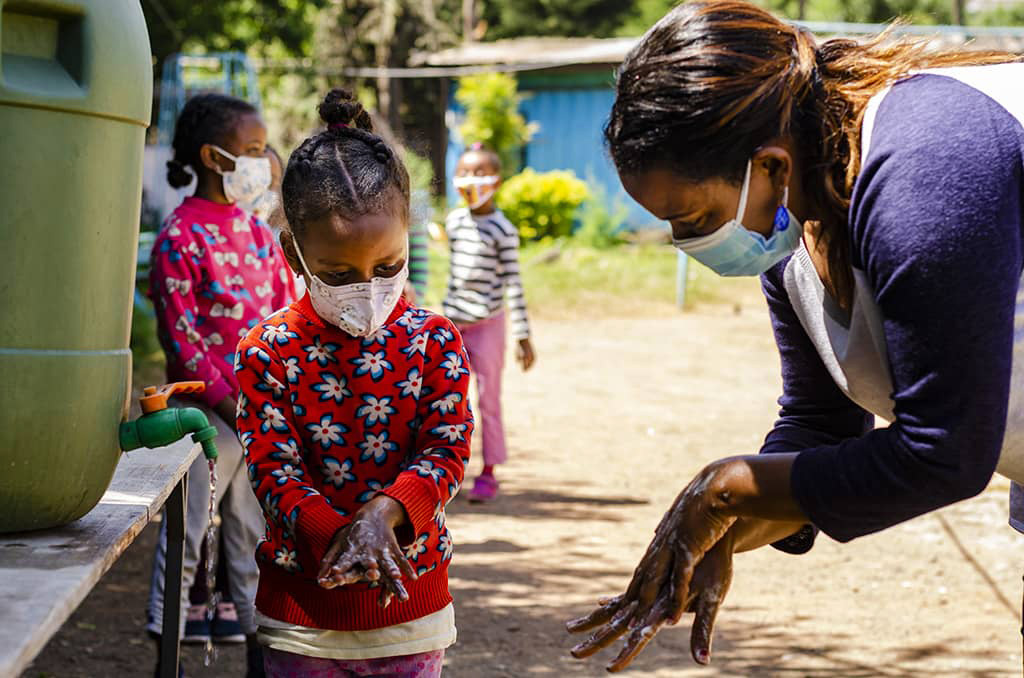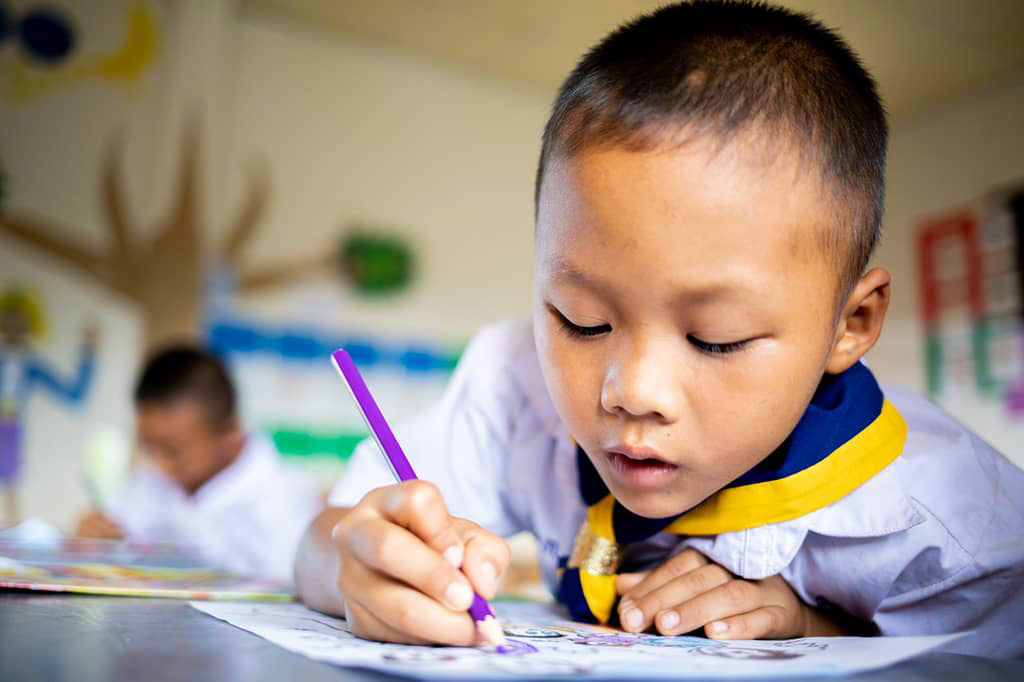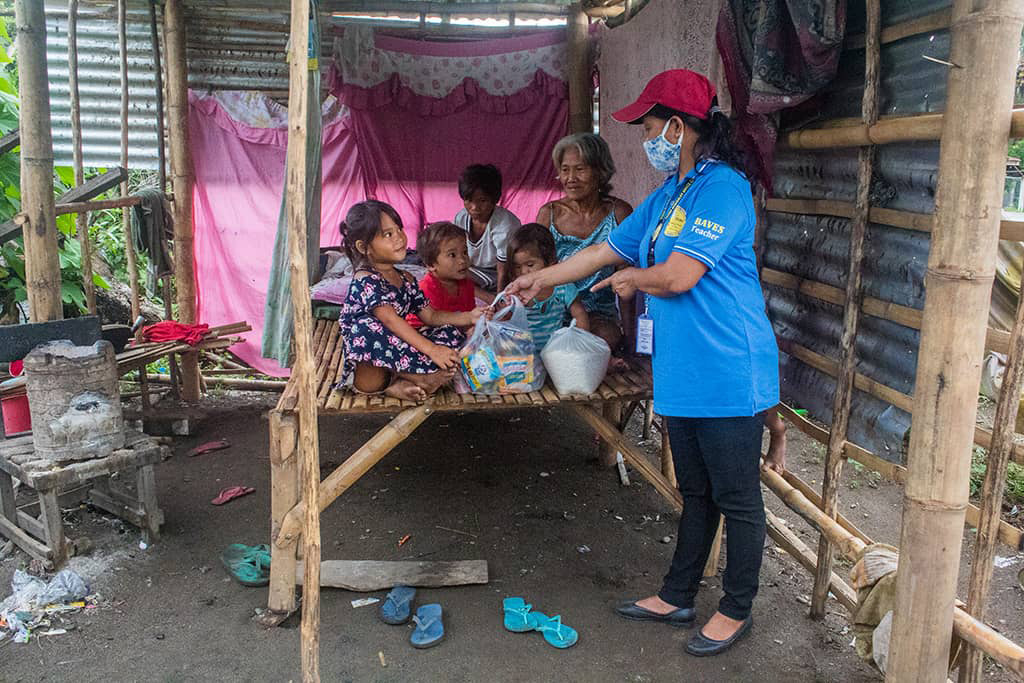You may be wondering how Compassion projects have been caring for your sponsored child during this pandemic. It’s been an unsettling time for so many people and we’ve been working hard to provide regular updates on the general situation in all 29 countries we work in.
Yet even in these difficult times, there’s been much to celebrate!
Our church partners have delivered hundreds of thousands of food packages, medical interventions, and hygiene kits to support children and their families. What’s more, they’ve been continuing their ministry to children in new and innovative ways.
If you’re a sponsor, you’ll have an email giving you an update about the status of your sponsored child’s project. To help you understand a bit more about what this means, we’ve gathered the following insights into the different ways sponsored children are participating in the Compassion programme during this pandemic.
We’d be grateful for your prayers as our local church partners continue to work with restrictions and new social distancing rules. May they continue to support sponsored children with wisdom, flexibility, and perseverance.
Attending project activities as normal
Attending project activities in small groups
Receiving care and support at home
Taking part in activities by distance learning
Attending project activities as normal
This is wonderful news. The project has fully reopened, and normal programme activities have resumed. These projects have been deep-cleaned and are implementing extra precautions based on local guidelines, such as social distancing and mask-wearing, to ensure children and staff stay safe and healthy.
An example from Ethiopia
Hearts pounding with excitement, the children held their parents’ hands tightly as they walked along the road. Even with masks covering their smiles, their eyes revealed the joy they felt returning to the Compassion project after seven months.
The project usually filled the church with laughter, shouts of joy and lively activity, but since the introduction of COVID-19 restrictions, the building has lain empty.

“With the lifting of the state of emergency and the plan to reopen schools, we decided it was necessary to start thinking about resuming our normal activities,” Marta, the project director, explains.
“We wanted to make sure the children are well prepared for school and to train them in the hygiene procedures well ahead of time.”
Coming back to the project, the children knew the rules: no hugging, handshaking, or high-fives from the project staff when they enter the compound. They also knew to keep their distance from each other, wash their hands and wear their masks.
Their new routine is now well established. As they enter the project, the children wash their hands with soap. A healthcare worker, Saba, monitors their handwashing and encourages them in specific techniques.
After a Bible story session, the children again practise their handwashing routines. Saba makes sure each child keeps their distance as they wait for their turn. She continually reminds them of the importance of frequent handwashing and following good hand hygiene practices in all places, including school.
Nunu, Kirubel’s mother, says the project “has provided us with health education and hygiene materials since COVID-19 started in the country. The staff remained by our side. I’m so happy that they have taken the initiative to train our children so they can be ready for school. The children have even started monitoring our hygiene activities at home! I feel very confident that they will be okay and we will all come out of this season healthy and safe.”
Attending project activities in small groups
Children can now gather at their Compassion project or at their homes in small groups led by a tutor, staff member or volunteer. In these small groups they receive lessons and get valuable social time with their friends and the project team. Staff members continue to identify the needs of the families they serve and distribute food and hygiene supplies where appropriate.
An example from Thailand
When schools closed across Thailand in March 2020, Compassion project staff were concerned how the children would study at home. The children didn’t have internet access, smartphones or computers, so they weren’t able to study online.
Teachers at the local school and project staff came up with a solution.

“During the school closures due to the pandemic, our children were put into small groups, and teachers came to teach at their homes because none of our children have access to the internet or a smartphone to learn their lessons online,” explains Kusuma, a Compassion project staff member.
“Our project staff would go and watch them learning at home from a distance to make sure everything is going well for the children.”
Ahead of the schools reopening in July, project staff prepared the children for the new hygiene measures they would encounter – temperature checks, handwashing, and applying hand sanitiser – before entering the classroom.
Armed with the knowledge and tools on preventing the virus, nothing could dampen the children’s excitement to see their friends on their first day back.
“At home, during the school closure, my teachers and project staff came to visit me and help me in my studies at home,” says 10-year-old Wanee. “And now it is safe for us to go to school and I’m so happy that I can get to hang out with my classmates again.”
Receiving care and support at home
Local restrictions may prevent children from gathering at their Compassion project, but staff and volunteers are visiting children and their families in their homes. Alongside grocery packs and hygiene supplies for families that need them, they are delivering lesson packets so that children can continue to benefit from the Compassion child development curriculum. Their visits serve as a time of education and encouragement for the children.
An example from the Philippines
Rina misses walking little Prang-prang to the local Compassion project. She misses watching her granddaughter sing, recite verses, and “learn good things”.
The hardworking grandmother says, “The student centre is a place where the children can just enjoy themselves and where mothers are reminded that there is hope for these little ones.”
Since March, when the pandemic began, project activities have temporarily ceased.
Belle Gabuna, Compassion Project Direcor, explains: “But we know it is temporary. In the meantime, we understand that we should provide the same happiness to the children and their parents. We believe that the greatest thing we can do for them in the middle of the pandemic is to give comfort and hope.”
“We conduct home visitations to know and be updated on the children’s health and welfare, their family situation, and spiritual condition.”
Before the pandemic, they were regularly visiting Prang-prang and the other 195 children in the project. This time, all the singing, dancing, storytelling, and other activities that would normally take place at the project happened during a home visit. This way, Belle explains, staff can “continue to nurture them with God’s Word despite the situation we are in”.

Every Saturday, from morning until afternoon, Belle and eight teachers, five project staff members, and four volunteers travel to several communities to conduct the visits, staying mindful of the COVID-19 safety protocols.
“We check our body temperature and the children’s, we regularly wash our hands, wear a mask as we walk along, and always maintain distancing,” says Belle.
The home visits—the songs, lessons, and relief goods—provide a ray of hope and happiness to Rina, Prang-prang, and the entire family.
“I am thankful to Compassion and the church for the love that they have for my granddaughter,” says Rina.
Taking part in activities by distance learning
Local restrictions prevent children from gathering at their Compassion projects, and staff and volunteers aren’t able to visit children in their homes. Staff have had to innovate to stay in contact with children and families. Many projects have provided distance-learning via video lessons and broadcasted lessons on local radio stations. They’ve also made regular phone calls to families, identifying needs and ensuring each child and family feel known and loved. Staff continue to deliver supplies, including food and hygiene items, as they are safely able.
An example from El Salvador
El Salvador’s national quarantine during the global COVID-19 pandemic meant sponsored children were forced to stop attending their Compassion projects. Despite the quarantine, a group of committed Compassion volunteers and tutors started to produce educational videos – recording themselves teaching the project curriculum for the children to watch at home.

“Sponsors, don’t worry. Because amid this crisis, Compassion is doing everything possible to continue sharing the gospel and curricular lessons to their children,” reassures Raúl, a tutor at the Compassion project.
The team made daily recordings to send a constant stream of videos to the children during lockdown. The project used social media and messaging applications like WhatsApp to share the lessons with Compassion projects and families across the country.
While not all children will be able to access the videos, staff are trying to get them into as many homes as possible.

“We are going to face many challenges using this virtual method, because not all the caregivers have internet access or mobile phones, but that is not going to stop us from impacting the lives of the children who could have access,” says tutor Jennifer Delgado.
Unknown or not listed
At this time, your sponsored child’s project has not been able to report its status. This could be for a variety of reasons, including poor internet connection. Please know that even if a project status is unavailable, your sponsored child is still being cared for by staff and volunteers. Staff are identifying needs and ensuring that families have access to hygiene supplies, food, and educational resources.
We hope knowing more about the different ways your sponsored child is currently receiving care and support encourages you in this season. Through our Christ centred, church driven and child focused care, we’re ensuring each sponsored child is known, loved, and protected.
Thank you so much for your continued and faithful support. If you’re interested in regular updates, please do visit our COVID news page for more information.




